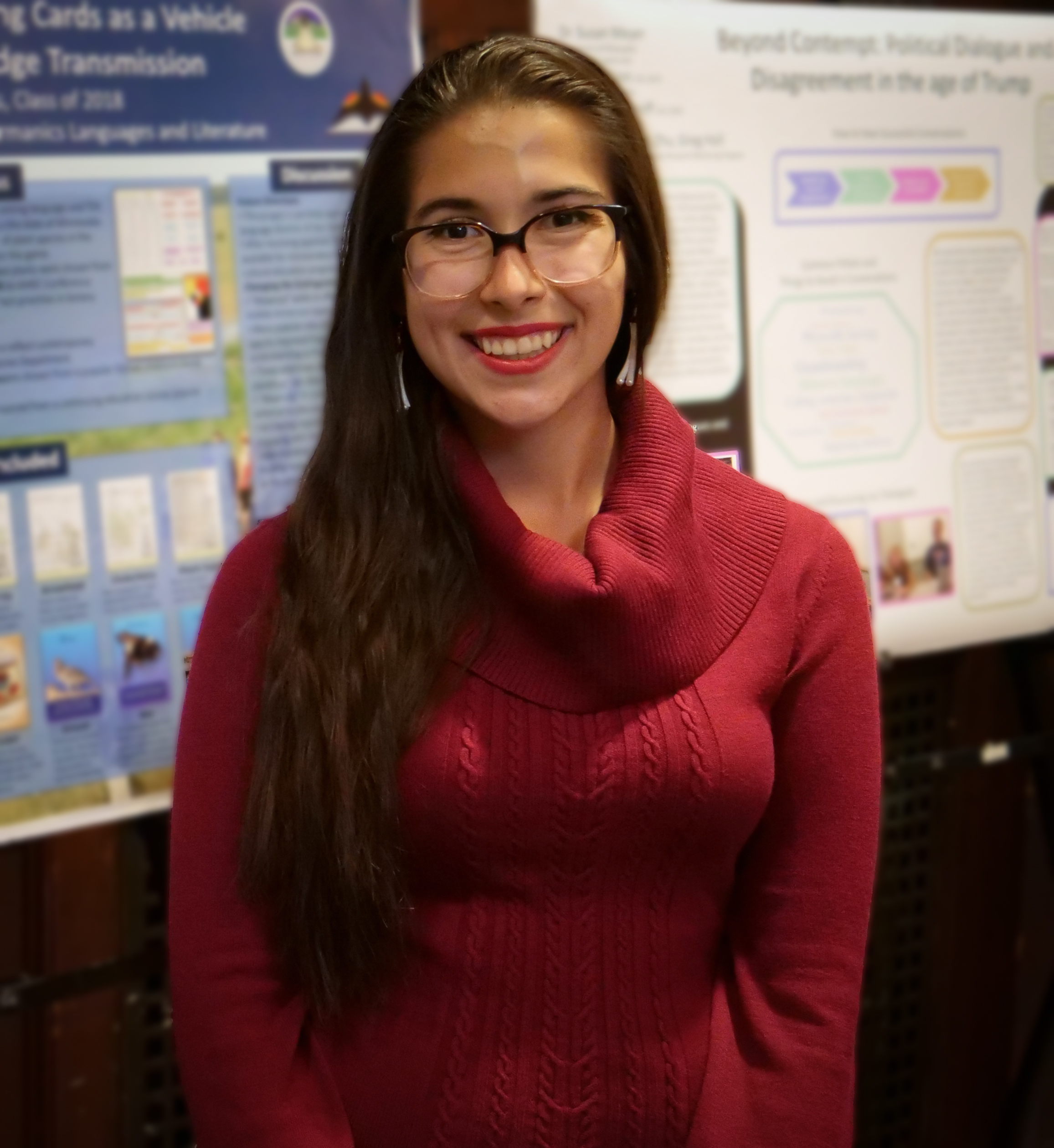Playing Cards to Revitalize Language and Promote Ecological Diversity
Ana Alonso, C’18, develops card games to transmit Traditional Ecological Knowledge in Flathead Nation.
Since the summer after her sophomore year, Ana Alonso, C’18, a double major in linguistics and environmental science, has worked with tribes in the Flathead Nation in Montana to help preserve and transmit Traditional Ecological Knowledge (TEK). Alonso’s interests in environmental preservation, climate change, and language revitalization converge in her work to develop a game that shares TEK through playing cards. In October, she presented on this game at the Fall Research Expo and Open House hosted by Penn’s Center for Undergraduate Research and Fellowship (CURF).
What is TEK and how does it contrast with more Western approaches to environmental science, stewardship, and management?
TEK is the indigenous way of viewing the world. Contrasted with Western science, where we look at things objectively, TEK is grounded in reciprocity with the environment. TEK positions individuals directly in their environmental milieus—they’re understood to be dependent on the environment and responsible for it, rather than objective observers.
It’s a community-specific knowledge that comes from direct contact with the environment over time—thousands of years—and is traditionally passed down from generation to generation. What’s interesting to note is that regions around the world with the highest biodiversity are shaped by TEK-based management by indigenous people.
You received a Penn Climate Action Grant to develop a TEK card game for an Anishinaabe group in Minnesota and then presented on this game at the CURF Expo. Why cards?
A concern echoed throughout Indian country is that the ability to recognize—and steward—hundreds and hundreds of plant and animal species is getting lost over time. Traditional ecological knowledge is dying more with each generation. I once spoke with a Confederated Salish elder who lamented that few people pick chokecherry berries anymore—whereas just 30 years ago picking was common. Not only do people not use or recognize chokecherries, they don’t know which basket is best for collecting them or which animals also eat the berries. With this loss of knowledge comes loss of tribal languages.
The question for tribal elders is how to transmit TEK before it’s forgotten for good. Mainstream American science curricula don’t reflect Indigenous science or TEK, so the information isn’t presented in schools. Educational games become a way of transmitting this information and revitalizing language at the same time.
I’m a linguistic consultant for a company called Native Teaching Aids, which creates materials to maintain and revitalize indigenous cultures, languages, and histories. I became involved with Native Teaching Aids in 2016 and have helped develop games for the Blackfeet Nation and Confederated Salish tribe.
Currently, I’m working on a card game called “Mawinzo” or “Picking Berries.” With support from the grant, I spent a summer researching and developing the game with and for a tribe in Minnesota. It’s based on other games I’ve worked on for Native Teaching Aids. Mawinzo is currently under review by tribal leaders.
On your CURF Expo poster, you expressed an interest in “changing the ecolinguistic game paradigm.” Tell us more.
Gamification is cool! What separates Native Teaching Aids games from other popular language-learning games is that ours are finite—someone will always win—whereas others are indefinite, without a win condition.
In Mawinzo, for example, players collect berry cards to feed their tribe, and the player who feeds the most tribal members wins the game. Learning Ojibwe and gaining traditional ecological knowledge is necessary to advance in the game. Say you have a sumac card. It’s not enough to just have the card in your hand. To be able to play it, you must know the Ojibwe name for the berry—“baakwaanaatig”—and how to pick the berry, including which basket to use, as well as what animals also eat baakwaanaatig. And there are other cards that can threaten your advancement in the game. So players learn these things as they go, but they don’t get points for knowing the information. Instead, the win condition is: "I've fed the most number of people with the cards I've collected."
In many popular language games, players get points for learning vocabulary or syntax. They collect points, but there’s really no end to playing. This approach is great for learning a language, but it’s a different paradigm than Native Teaching Aids games.
Our games are designed for immersion in both language and ecology. The games are educational but also really fun. They become a resource for schools, community groups, and families and are a great way to engage people of all ages who like games.



